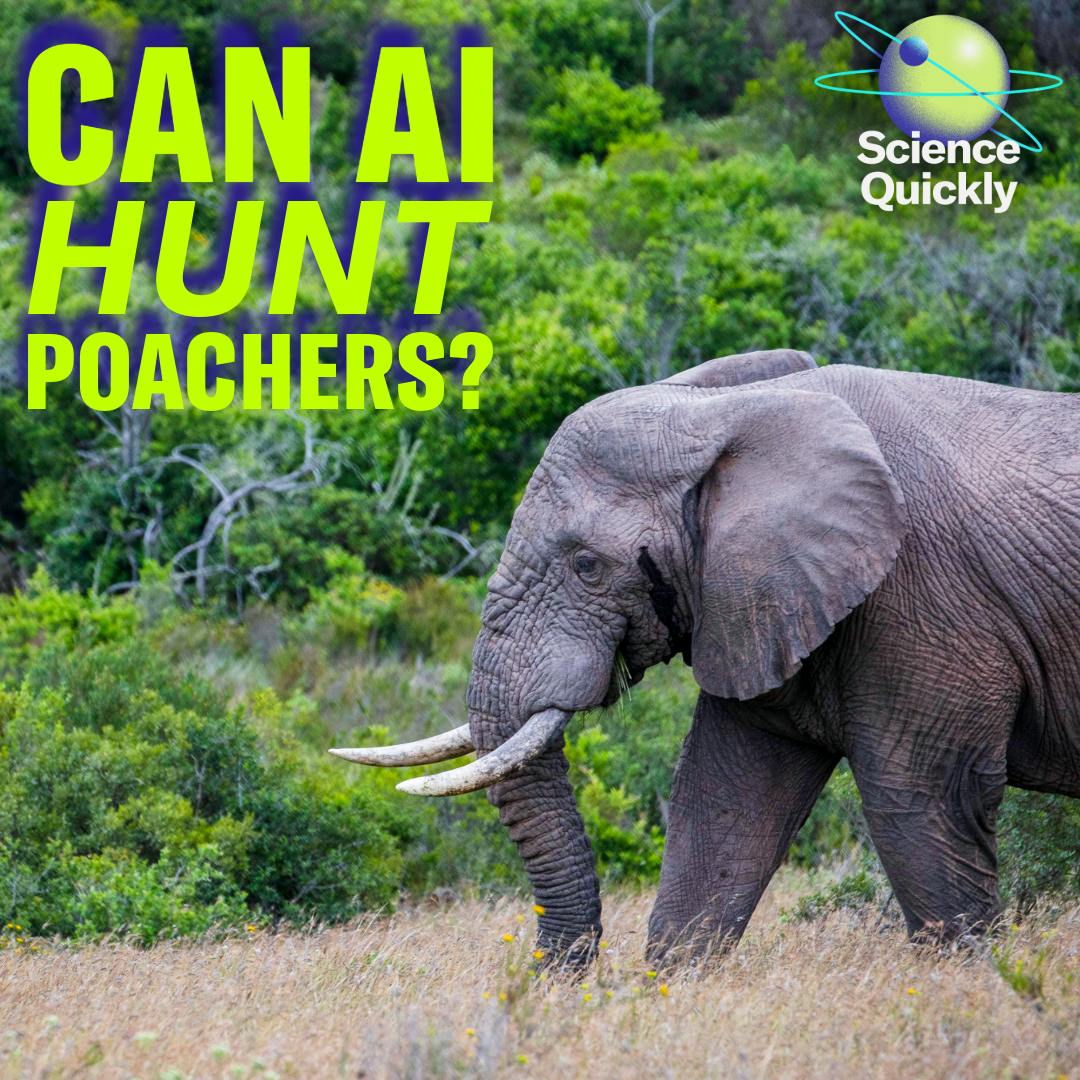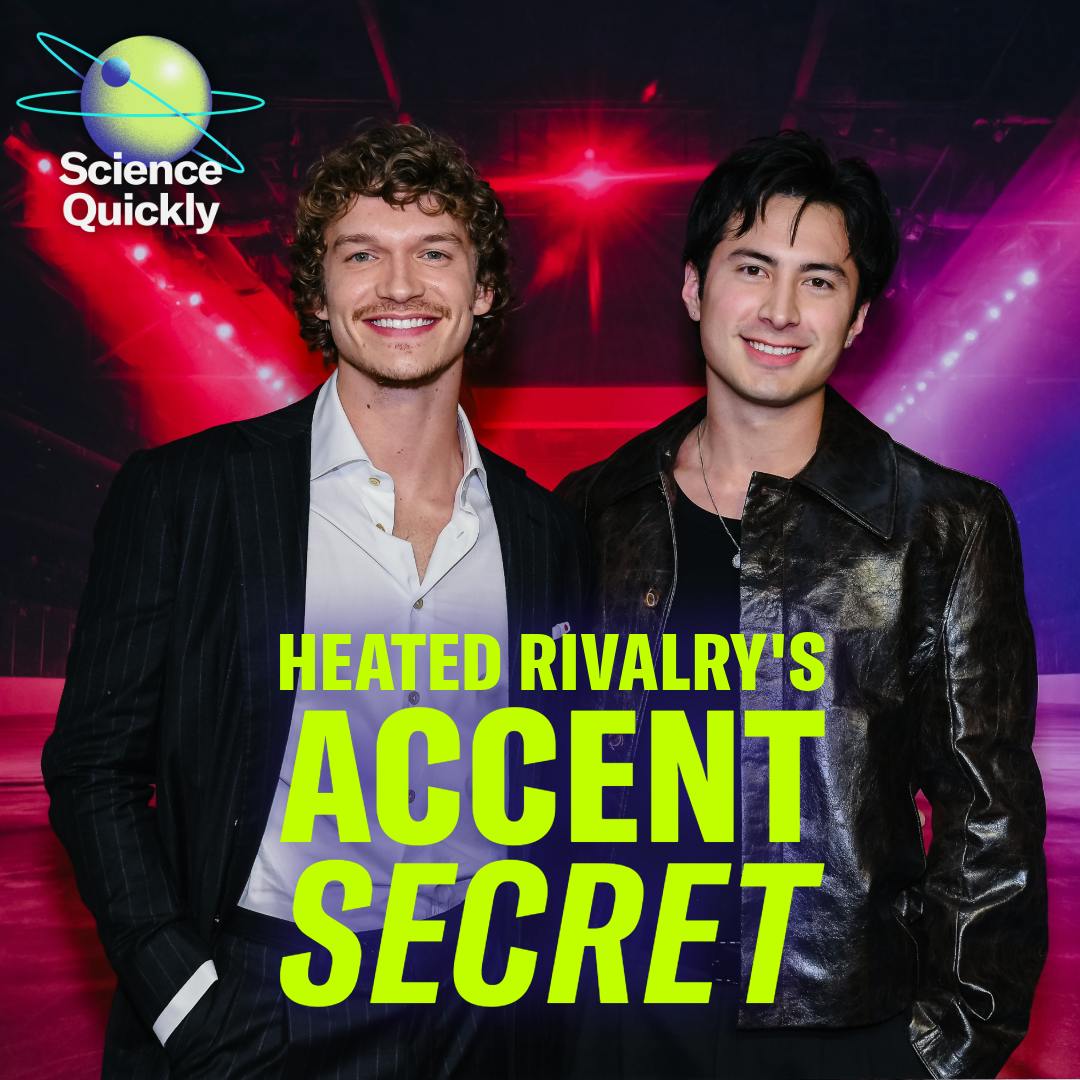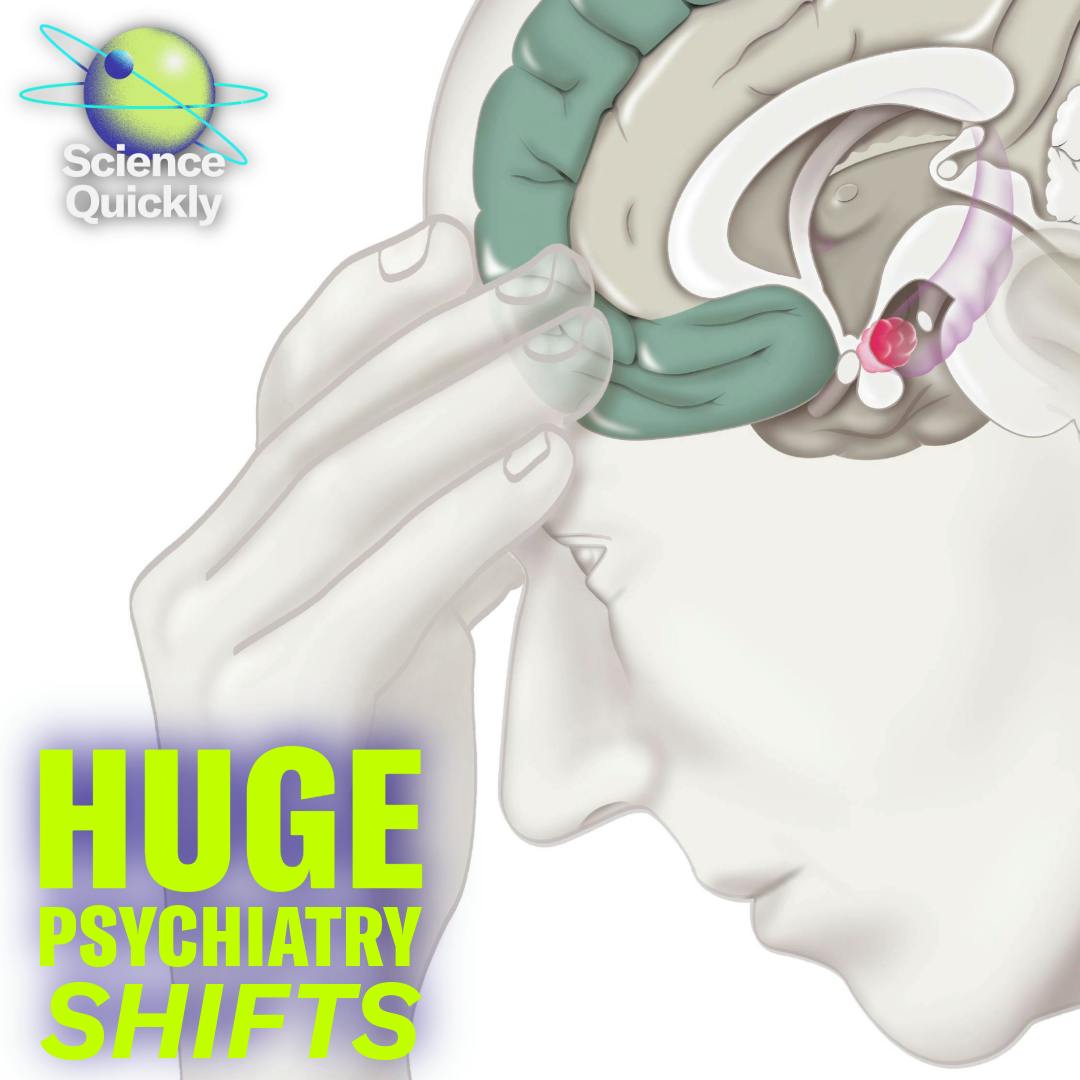Discover Science Quickly
Science Quickly

Science Quickly
Author: Scientific American
Subscribed: 52,350Played: 1,505,463Subscribe
Share
© Scientific American, a Division of Springer Nature America, Inc.
Description
Host Rachel Feltman, alongside leading science and tech journalists, dives into the rich world of scientific discovery in this bite-size science variety show.
1894 Episodes
Reverse
In this episode of Science Quickly, freelance wildlife writer Melissa Hobson investigates how a 17‑year‑old’s breakthrough artificial-intelligence-based gunshot detector could transform antipoaching efforts by giving rangers real-time alerts from deep inside noisy rainforests. She breaks down why this lightweight neural network outperforms traditional tools, how it could help protect critically endangered African forest elephants, and what conservation scientists say about the future of AI‑driven wildlife protection.
Recommended Reading:
Illegal Wildlife Trade Tied to Drugs, Arms and Human Trafficking
How AI Can Help Save Endangered Species
Elephants’ peculiar whiskers help them sense the world around them
E-mail us at sciencequickly@sciam.com if you have any questions, comments or ideas for stories we should cover!
Discover something new everyday: subscribe to Scientific American and sign up for Today in Science, our daily newsletter.
Science Quickly is produced by Kendra Pierre-Louis, Fonda Mwangi, Sushmita Pathak and Jeff DelViscio. This episode was edited by Alex Sugiura, with fact-checking by Shayna Posses and Aaron Shattuck. Our theme music was composed by Dominic Smith.
Learn more about your ad choices. Visit megaphone.fm/adchoices
In this episode of Science Quickly, we explore what research reveals about polyamory, how multipartner relationships actually function and why communication and consent are central to making them work. Anthropologist Rebecca J. Lester helps break down common myths, highlight the ethics at the core of polyamory and shares insights that can strengthen any relationship—monogamous or otherwise.
Recommended Reading:
The truth about polyamory
New Sexual Revolution: Polyamory May Be Good for You
How often do people fall passionately in love? The answer may be less than you think
E-mail us at sciencequickly@sciam.com if you have any questions, comments or ideas for stories we should cover!
Discover something new everyday: subscribe to Scientific American and sign up for Today in Science, our daily newsletter.
Science Quickly is produced by Kendra Pierre-Louis, Fonda Mwangi, Sushmita Pathak and Jeff DelViscio. This episode was edited by Alex Sugiura, with fact-checking by Shayna Posses and Aaron Shattuck. Our theme music was composed by Dominic Smith.
Learn more about your ad choices. Visit megaphone.fm/adchoices
In this Science Quickly news roundup, we look at the Food and Drug Administration’s surprising change of heart on reviewing Moderna’s mRNA flu shot, a promising new inhaled vaccine that could fight multiple respiratory bugs at once and fresh research that ties air pollution to higher Alzheimer’s risk. We also check in on the latest Artemis II “wet dress rehearsal” and meet a newly discovered spinosaurid dinosaur that turns old assumptions about such dinos’ habitat on their head.
Recommended Reading:
FDA agrees to review Moderna mRNA flu vaccine in dramatic reversal
Newly discovered horned dinosaur was like a unicorn from hell
NASA just passed a major milestone on its mission to return humans to the moon
NASA reveals new problem with Artemis II rocket, further delaying launch
E-mail us at sciencequickly@sciam.com if you have any questions, comments or ideas for stories we should cover!
Discover something new everyday: subscribe to Scientific American and sign up for our daily newsletter.
Science Quickly is produced by Kendra Pierre-Louis, Fonda Mwangi, Sushmita Pathak and Jeff DelViscio. This episode was edited by Alex Sugiura, with fact-checking by Shayna Posses and Aaron Shattuck. Our theme music was composed by Dominic Smith.
Learn more about your ad choices. Visit megaphone.fm/adchoices
Many of the events in the Winter Olympics involve some sort of sliding or slipping on ice—in a skillful, controlled way. Those moves often seem effortless, but the physics behind what makes them possible is messy. For centuries, scientists have been trying to figure out why ice is slippery. In this episode of Science Quickly, host Kendra Pierre-Louis laces up her skates to explore the slippery truth behind that deceptively simple question. She’s joined by science journalist Paulina Rowińska and physicists Daniel Bonn and Martin Müser, who take us through various competing theories and explain how we may finally have a winner.
Recommended Reading:
“Why Is Ice Slippery? A New Hypothesis Slides Into the Chat,” by Paulina Rowińska, in Quanta Magazine. Published online December 8, 2025
E-mail us at sciencequickly@sciam.com if you have any questions, comments or ideas for stories we should cover!
Discover something new everyday: subscribe to Scientific American and sign up for our daily newsletter.
Science Quickly is produced by Kendra Pierre-Louis, Fonda Mwangi, Sushmita Pathak and Jeff DelViscio. This episode was edited by Alex Sugiura, with fact-checking by Shayna Posses and Aaron Shattuck. Our theme music was composed by Dominic Smith.
Learn more about your ad choices. Visit megaphone.fm/adchoices
In this episode of Science Quickly, multimedia journalist Meghan McDonough explores how emerging artificial-intelligence‑powered “smart home” tools are helping people with Alzheimer’s disease and other conditions that cause dementia stay safer at home while easing the load on caregivers. And McDonough examines the key ethical, privacy and access questions that come with relying on these technologies.
Recommended Reading:
Meet Your Future Robot Servants, Caregivers and Explorers
The Heartbreak and Hazards of Alzheimer’s Caregiving
E-mail us at sciencequickly@sciam.com if you have any questions, comments or ideas for stories we should cover!
Discover something new everyday: subscribe to Scientific American and sign up for our daily newsletter.
Science Quickly is produced by Kendra Pierre-Louis, Fonda Mwangi, Sushmita Pathak and Jeff DelViscio. This episode was reported and co-hosted by Meghan McDonough and edited by Alex Sugiura. Shayna Posses and Aaron Shattuck fact-check our show. Our theme music was composed by Dominic Smith.
Learn more about your ad choices. Visit megaphone.fm/adchoices
In this episode of Science Quickly, we unpack the Trump administration’s move to repeal the Environmental Protection Agency’s “endangerment finding” and its effect on the future of U.S. climate policy. We also look at why this winter has felt brutally cold to many on the East Coast. Plus, we explore the physics behind a rumored ski jumping controversy at the Winter Olympics—a rather NSFW scandal—that involves hyaluronic acid and male genitals.
Recommended Reading:
EPA scraps the ‘endangerment finding’ that climate change harms human health
Why has this winter been so cold?
The physics of ‘Penisgate’ and how ski jumpers fly
E-mail us at sciencequickly@sciam.com if you have any questions, comments or ideas for stories we should cover!
Discover something new everyday: subscribe to Scientific American and sign up for our daily newsletter.
Science Quickly is produced by Kendra Pierre-Louis, Fonda Mwangi, Sushmita Pathak and Jeff DelViscio. This episode was edited by Alex Sugiura, with fact-checking by Shayna Posses and Aaron Shattuck. Our theme music was composed by Dominic Smith.
Learn more about your ad choices. Visit megaphone.fm/adchoices
With Valentine’s Day around the corner, kissing may be on your mind. But why do we kiss? In this episode of Science Quickly, evolutionary biologist Matilda Brindle joins host Kendra Pierre-Louis to uncover the evolutionary roots of kissing. We trace kissing back 21.5 million years and learn how it’s common among primates and what that tells us about how kissing may have evolved among humans. Plus, we also unpack recent findings that hint that humans and Neandertals may have once locked lips.
Recommended Reading:
Kissing May Have Evolved 21.5 Million Years Ago
E-mail us at sciencequickly@sciam.com if you have any questions, comments or ideas for stories we should cover!
Discover something new every day: subscribe to Scientific American and sign up for our daily newsletter.
Science Quickly is produced by Kendra Pierre-Louis, Fonda Mwangi, Sushmita Pathak and Jeff DelViscio. This episode was edited by Alex Sugiura, with fact-checking by Shayna Posses and Aaron Shattuck. Our theme music was composed by Dominic Smith.
Learn more about your ad choices. Visit megaphone.fm/adchoices
In this episode of Science Quickly, hosts Kendra Pierre-Louis and Allison Parshall dive into the surprising linguistics behind the hit TV series Heated Rivalry. Pierre-Louis and Parshall speak with the show’s Russian dialect coach Kate Yablunovsky about how she helped actor Connor Storrie deliver impressively authentic Russian dialogue on a tight time line. Yablunovsky breaks down what the toughest Russian sounds are for English speakers, why perfect accents aren’t always the goal and how cultural context, mouth posture and psychology all shape believable performances.
E-mail us at sciencequickly@sciam.com if you have any questions, comments or ideas for stories we should cover!
Discover something new everyday: subscribe to Scientific American and sign up for our daily newsletter.
Science Quickly is produced by Kendra Pierre-Louis, Fonda Mwangi, Sushmita Pathak and Jeff DelViscio. This episode was edited by Alex Sugiura, with fact-checking by Shayna Posses and Aaron Shattuck. Our theme music was composed by Dominic Smith.
Learn more about your ad choices. Visit megaphone.fm/adchoices
In this episode of Science Quickly, we dive into NASA’s latest headaches as the Artemis II moon mission hits delays. We also take a look at a massive solar flare that lit up the skies—and disrupted some tech—along with fresh concerns that PFAS “forever chemicals,” used to replace ozone‑depleting substances, are accumulating far more than expected. And new research shows that babies are actually born with a sense of rhythm.
Recommended Reading:
NASA document reveals new Artemis II moon mission target launch dates for March
NASA delays Artemis II moon mission after critical test raises issues
NASA’s Artemis II launch rehearsal hits a snag
The sun just unleashed its most powerful solar flare in years
Nearly half of people in the U.S. have toxic PFAS in their drinking water
E-mail us at sciencequickly@sciam.com if you have any questions, comments or ideas for stories we should cover!
Discover something new everyday: subscribe to Scientific American and sign up for our daily newsletter.
Science Quickly is produced by Kendra Pierre-Louis, Fonda Mwangi, Sushmita Pathak and Jeff DelViscio. This episode was edited by Alex Sugiura, with fact-checking by Shayna Posses, Emily Makowski and Aaron Shattuck. Our theme music was composed by Dominic Smith.
Learn more about your ad choices. Visit megaphone.fm/adchoices
In this episode of Science Quickly, we dig into a brewing shake-up inside psychiatry as the American Psychiatric Association considers sweeping changes to the way mental illness is defined and diagnosed. Scientific American’s associate editor Allison Parshall breaks down what the potential changes are, why long-standing diagnostic categories may no longer reflect scientific reality and what these revisions could ultimately mean for patients.
Recommended Reading:
Psychiatrists plan to overhaul the mental health bible—and change how we define ‘disorder’
E-mail us at sciencequickly@sciam.com if you have any questions, comments or ideas for stories we should cover!
Discover something new everyday: subscribe to Scientific American and sign up for our daily newsletter.
Science Quickly is produced by Kendra Pierre-Louis, Fonda Mwangi, Sushmita Pathak and Jeff DelViscio. This episode was edited by Alex Sugiura, with fact-checking by Shayna Posses and Aaron Shattuck. Our theme music was composed by Dominic Smith.
Learn more about your ad choices. Visit megaphone.fm/adchoices
Can you imagine not being able to burp at all? In this episode of Science Quickly, we dive into the little-known but surprisingly serious “no burp” syndrome known as retrograde cricopharyngeus dysfunction (RCPD). Otolaryngologist Robert Bastian, who co-authored the paper that first defined RCPD in 2019, explains what causes this unusual condition and how it can make daily life miserable. But relief can come from an unexpected source: a Botox injection that gives patients the chance to “learn” how to burp—an experience many describe as life-changing.
Recommended Reading:
Explore a collection of articles and resources about RCPD by Robert Bastian
E-mail us at sciencequickly@sciam.com if you have any questions, comments or ideas for stories we should cover!
Discover something new everyday: subscribe to Scientific American and sign up for our daily newsletter.
Science Quickly is produced by Kendra Pierre-Louis, Fonda Mwangi, Sushmita Pathak and Jeff DelViscio. This episode was edited by Alex Sugiura, with fact-checking by Shayna Posses and Aaron Shattuck. Our theme music was composed by Dominic Smith.
Learn more about your ad choices. Visit megaphone.fm/adchoices
In this episode of Science Quickly, we dive into Google DeepMind’s new artificial intelligence model AlphaGenome, which could help researchers better understand how noncoding DNA shapes gene expression. We also look at how doctors pulled off a medical marvel when they kept a man alive without lungs for two days. Plus, we learn how researchers cracked an evolutionary puzzle involving a peculiar flower.
Recommended Reading:
Google DeepMind unleashes new AI to investigate DNA’s ‘dark matter’
Doctors keep patient alive using ‘artificial lungs’ for two days
Babies who attend daycare share ‘good’ germs, too
E-mail us at sciencequickly@sciam.com if you have any questions, comments or ideas for stories we should cover!
Discover something new everyday: subscribe to Scientific American and sign up for our daily newsletter.
Science Quickly is produced by Kendra Pierre-Louis, Fonda Mwangi, Sushmita Pathak and Jeff DelViscio. This episode was edited by Alex Sugiura, with fact-checking by Shayna Posses and Aaron Shattuck. Our theme music was composed by Dominic Smith.
Learn more about your ad choices. Visit megaphone.fm/adchoices
In this episode of Science Quickly, host Kendra Pierre-Louis talks with Katie Hafner of the podcast Lost Women of Science about the remarkable but often overlooked physicist and chemist Katharine Burr Blodgett, whose pioneering work in early nanotechnology led to nonreflective glass. Hafner shares why the Lost Women of Science team devoted nearly a year to uncovering Blodgett’s full story and reflects on the broader mission to restore women to the scientific record.
Recommended Reading:
The chemical genius of Katharine Burr Blodgett
Listen to more podcasts from the Lost Women of Science Initiative
E-mail us at sciencequickly@sciam.com if you have any questions, comments or ideas for stories we should cover!
Discover something new everyday: subscribe to Scientific American and sign up for our daily newsletter.
Science Quickly is produced by Kendra Pierre-Louis, Fonda Mwangi, Sushmita Pathak and Jeff DelViscio. This episode was edited by Alex Sugiura, with fact-checking by Shayna Posses and Aaron Shattuck. Our theme music was composed by Dominic Smith.
Learn more about your ad choices. Visit megaphone.fm/adchoices
Many people turn to expensive perfumes to elevate their natural scent and smell more pleasant to others. But what if you could achieve that just by switching up your diet? In this episode of Science Quickly, host Kendra Pierre-Louis talks with freelance journalist Sofia Quaglia about the science behind how what we eat can subtly change how we smell—and how attractive others perceive us to be. The conversation explores surprising findings about garlic and armpit odor, counterintuitive effects of meat intake on body scent and the strange, smelly experiments behind this research.
Recommended Reading:
“The foods that make you smell more attractive,” by Sofia Quaglia, in BBC Future. Published online November 2, 2025
E-mail us at sciencequickly@sciam.com if you have any questions, comments or ideas for stories we should cover!
Discover something new everyday: subscribe to Scientific American and sign up for our daily newsletter.
Science Quickly is produced by Kendra Pierre-Louis, Fonda Mwangi, Sushmita Pathak and Jeff DelViscio. This episode was edited by Alex Sugiura, with fact-checking by Shayna Posses and Aaron Shattuck. Our theme music was composed by Dominic Smith.
Learn more about your ad choices. Visit megaphone.fm/adchoices
In this episode of Science Quickly, we look at the stakes behind Artemis II, NASA’s historic lunar flyby mission that’s preparing to launch soon. We’ll also dive into the science behind Revoice, an artificial-intelligence-powered wearable device that could help stroke patients with speech impairment communicate. Plus, we discuss how previously overlooked art on the ceiling of an Indonesian cave could rewrite the story of early human migration.
Recommended Reading:
NASA’s historic Artemis II moon mission is almost ready to launch
Oldest cave art ever found discovered in Indonesia
‘Bat accelerator’ unlocks new clues to how these animals navigate
E-mail us at sciencequickly@sciam.com if you have any questions, comments or ideas for stories we should cover!
Discover something new everyday: subscribe to Scientific American and sign up for our daily newsletter.
Science Quickly is produced by Kendra Pierre-Louis, Fonda Mwangi, Sushmita Pathak and Jeff DelViscio. This episode was edited by Alex Sugiura, with fact-checking by Shayna Posses and Aaron Shattuck. Our theme music was composed by Dominic Smith.
Learn more about your ad choices. Visit megaphone.fm/adchoices
In this episode of Science Quickly, host Kendra Pierre-Louis speaks with forensic scientist Rhonda Roby about an ambitious effort to uncover traces of Leonardo da Vinci’s DNA using modern forensic techniques. Roby and her colleagues are carefully sampling centuries‑old artworks, working with extremely small amounts of biological material, to learn more about Leonardo himself and the history of his art while also advancing methods that could one day help authenticate artworks. The episode explores how forensic approaches typically used in criminal investigations are being applied to a 500‑year‑old historical puzzle.
Recommended Reading:
The Race to Find Leonardo da Vinci’s DNA Just Took a Major Twist
“The real da Vinci code,” by Richard Stone, in Science, Vol. 391; January 8, 2026
E-mail us at sciencequickly@sciam.com if you have any questions, comments or ideas for stories we should cover!
Discover something new everyday: subscribe to Scientific American and sign up for our daily newsletter.
Science Quickly is produced by Kendra Pierre-Louis, Fonda Mwangi, Sushmita Pathak and Jeff DelViscio. This episode was edited by Alex Sugiura, with fact-checking by Shayna Posses and Aaron Shattuck. Our theme music was composed by Dominic Smith.
Learn more about your ad choices. Visit megaphone.fm/adchoices
In this episode, we explore what consciousness is, how the brain creates it and what current science says about dreams, anesthesia, animals and even artificial intelligence. Scientific American’s associate editor Allison Parshall breaks down what the leading theories are and why understanding our own awareness remains one of science’s toughest challenges.
Recommended Reading:
Why consciousness is the hardest problem in science
Is Consciousness the Hallmark of Life?
How to Detect Consciousness in People, Animals and Maybe Even AI
When does consciousness emerge in babies?
E-mail us at sciencequickly@sciam.com if you have any questions, comments or ideas for stories we should cover!
Discover something new everyday: subscribe to Scientific American and sign up for our daily newsletter.
Science Quickly is produced by Kendra Pierre-Louis, Fonda Mwangi, Sushmita Pathak and Jeff DelViscio. This episode was edited by Alex Sugiura, with fact-checking by Shayna Posses and Aaron Shattuck. Our theme music was composed by Dominic Smith.
Learn more about your ad choices. Visit megaphone.fm/adchoices
In this episode of Science Quickly, we unpack the Environmental Protection Agency’s controversial decision to change how it calculates health benefits from regulating certain air pollutants, a move that experts warn could lead to dirtier air and worse health outcomes. And we’ve achieved a major milestone in cancer care, with five-year survival rates hitting a record high, but looming policy threats could stall progress. Plus, NASA’s first-ever medical evacuation from the International Space Station could offer lessons for future missions.
Recommended Reading:
America’s Air Is about to Get Dirtier—And More Dangerous
70 Percent of Cancer Patients Now Survive at Least Five Years, Study Finds
Astronauts Evacuate the ISS after Medical Incident
New Study Probes How Same-Sex Behaviors Evolved in Nonhuman Primates
E-mail us at sciencequickly@sciam.com if you have any questions, comments or ideas for stories we should cover!
Discover something new everyday: subscribe to Scientific American and sign up for our daily newsletter.
Science Quickly is produced by Kendra Pierre-Louis, Fonda Mwangi, Sushmita Pathak and Jeff DelViscio. This episode was edited by Alex Sugiura, with fact-checking by Shayna Posses and Aaron Shattuck. Our theme music was composed by Dominic Smith.
Learn more about your ad choices. Visit megaphone.fm/adchoices
In this episode, we dive into the climate stakes behind Venezuela’s vast but troubled oil reserves and the country’s mounting tensions with neighboring Guyana. Climate reporter Amy Westervelt breaks down why the region’s heavy crude oil, aging infrastructure and escalating border dispute are colliding with the reality of a rapidly warming planet—and what rising seas, oil expansion and fragile ecosystems mean for millions of people across the Caribbean.
Recommended Reading:
“The U.S.-Venezuela-Guyana Oil Triangle,” by Amy Westervelt, in Drilled. Published online January 4, 2026
Why Does Venezuela Have So Much Oil? Geology
E-mail us at sciencequickly@sciam.com if you have any questions, comments or ideas for stories we should cover!
Discover something new everyday: subscribe to Scientific American and sign up for our daily newsletter.
Science Quickly is produced by Kendra Pierre-Louis, Fonda Mwangi, Sushmita Pathak and Jeff DelViscio. This episode was edited by Alex Sugiura, with fact-checking by Shayna Posses and Aaron Shattuck. Our theme music was composed by Dominic Smith.
Learn more about your ad choices. Visit megaphone.fm/adchoices
Seed oils have become a target of wellness influencers and high-profile public officials. They say that these widely used and relatively inexpensive oils, which include canola, soybean and sunflower oil, are toxic. But do we really need to panic? Host Kendra Pierre-Louis speaks with food science expert Eric Decker to unpack what seed oils actually are, how their fats compare with those from other sources and whether claims about their toxicity hold up to scientific scrutiny.
Recommended Reading:
RFK, Jr., Upsets Food Pyramid, Urging Americans to Eat More Meat
E-mail us at sciencequickly@sciam.com if you have any questions, comments or ideas for stories we should cover!
Discover something new everyday: subscribe to Scientific American and sign up for our daily newsletter.
Science Quickly is produced by Kendra Pierre-Louis, Fonda Mwangi, Sushmita Pathak and Jeff DelViscio. This episode was edited by Alex Sugiura, with fact-checking by Shayna Posses and Aaron Shattuck. Our theme music was composed by Dominic Smith.
Learn more about your ad choices. Visit megaphone.fm/adchoices



























Proper wellness care is essential for a healthy lifestyle. If you're looking for expert guidance on chiropractic care, nutrition, and overall well-being, check out Science Wellness for science-backed health solutions tailored to your needs!https://sciencewellness.net/
💚WATCH>>ᗪOᗯᑎᒪOᗩᗪ>>LINK>👉https://co.fastmovies.org
I can not download.
i wonder what lions thought of our sound 😂
nice😳
amazing update.
brilliant
perfect podcast🥰
This is a partisan piece of NPR crap.
#TIL While this is shorter and sired later than other podcasts that covered this paper, I actually found it to be the most interesting and fact filled.
Nicely done
trying to learn some random facts to pass the time
When restaurants first shut down early in the pandemic, Americans raided grocery stores. They started cooking more at home—and, presumably, generating more leftovers. Those leftovers can be a convenient future meal—but they’ve got a dark side, too. “There’s a tendency that if you put an item on a plate that’s a leftover, there’s a higher probability that you’re not going to fully consume that item. And so it’s probably going to go to waste.” Brian Roe, an applied economist at the Ohio State University. He and his colleagues recently studied leftovers and food waste by tracking the eating habits of 18 men and women in Baton Rouge, La. The participants tracked what they ate using an iPhone app. And during the weeklong study, the study subjects collectively piled 1,200 different foods on their plates. After analyzing what got eaten, saved or thrown away, the researchers found that leftovers were more likely to be picked at and not fully eaten—a finding we can all probably identify with.
من العيب جدا نطق حرف الجيم بشكل غير سليم و تعويضه بحرف لا وجود له في اللغة العربية. تقبلوا مروري
you can put transcripts in comment's part! it's so easy.
عقار لعلاج السكري يسبب فشل القلب.
Perfect
By now it's almost common knowledge that spending time in nature is good for you. Areas with more trees tend to be less polluted, so spending time there allows you to breathe easier. Spending time outdoors has been linked with reduced blood pressure and stress, and seems to motivate people to exercise more. “So it'll come as no surprise that there's research showing that spending time in nature is good. I mean, that's been known for millennia. There's dozens of papers showing that." University of Exeter Medical School researcher Mathew P. White. "We get this idea, patients are coming to us and they're saying, 'doctor, how long should I spend?' and the doctor is saying, 'I don't really know.'" So White and his team decided to find out by using data collected from nearly 20,000 people in England through the Monitor of Engagement with the Natural Environment Survey. And their answer? Two hours a week. People who spent at least that much time amid nature—either all at once or totaled over
upg
please add the transcript!